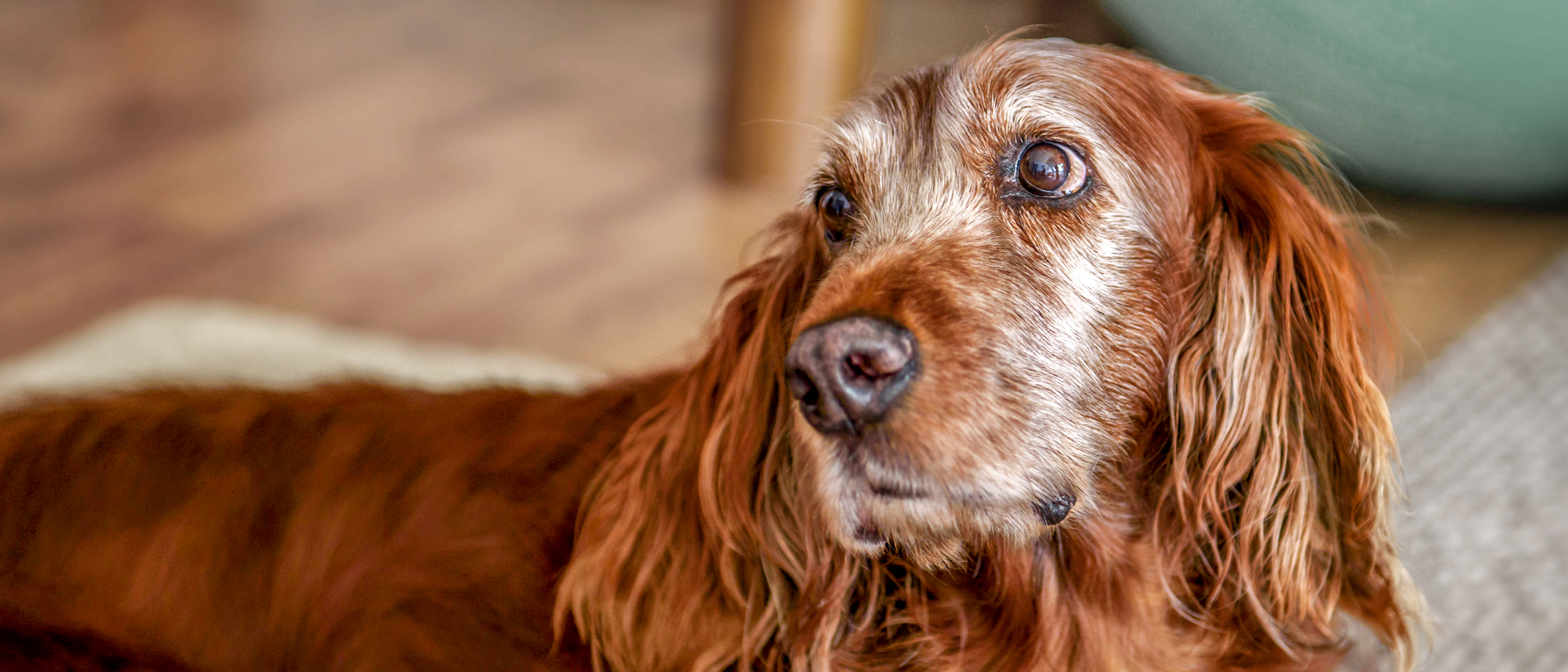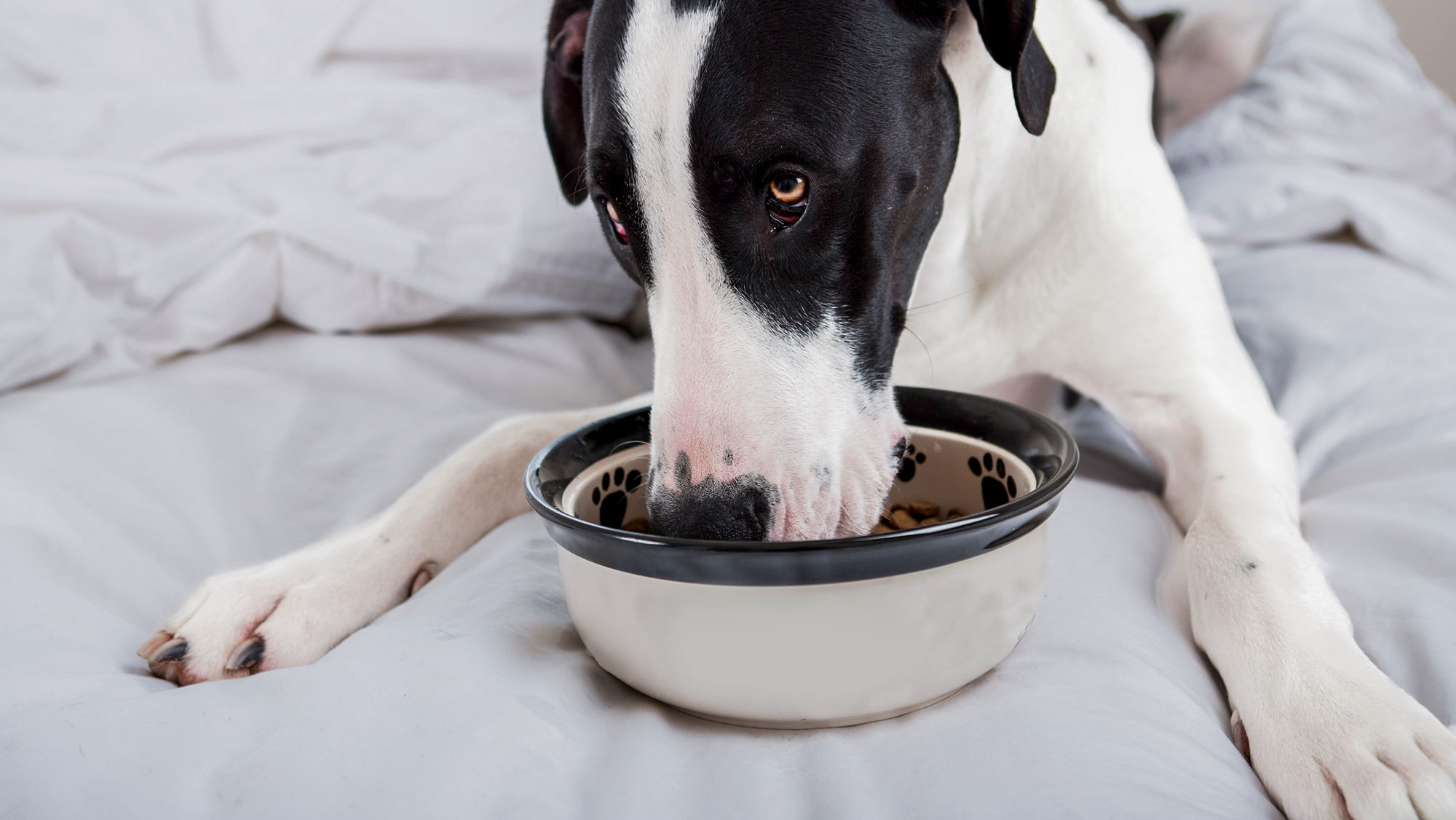Importance of nutrition changes for dogs according to their age

Growing puppies, fully grown adults and mature dogs all have different nutritional requirements. As a consequence, a diet needs to be adapted in every stage of life to ensure the dog remains as healthy as possible.
Ageing dog nutrition
Ageing dogs have a significantly different nutritional requirement to puppies, and even adult dogs. Good care is essential if a dog is to remain in good health throughout its life. Regular physical activity will ensure that the dog maintains its muscle mass and controls its weight. The condition of the teeth and the coat should also be monitored.
In terms of energy requirements, intake should be adapted to the animal's activity level, which depends on its age and any health concerns. An arthritic dog will move around less and so expend less energy, putting it at risk of unhealthy weight gain. A low energy diet is only imperative if the dog is overweight. It is very important not to simply assume that reduced enthusiasm for physical exercise is a normal consequence of ageing. The dog must be examined to check whether it is suffering from a disease.
Regular weighing and medical check-ups are the best way to ensure ageing-related problems are detected at the earliest opportunity.
Nutrition for ageing dogs
Ageing is also accompanied by the modification of digestive capacities and particular nutritional requirements, so food for ageing dogs should have the following characteristics:
Higher vitamin C and E content
These nutrients have antioxidant properties, protecting the body's against the harmful effects of the oxidative stress linked to ageing.
High-quality protein
Older dogs are less effective at using dietary protein than younger dogs due to their reduced digestive function. Improving protein quality is the main goal here. A fallacy in some countries is that protein is responsible for kidney failure. In fact, this is not the case. Kidney failure is a chronic, irreversible disease which is frequent with age. It's recommended to reduce phosphorus content in foods to slow down the progression of this disease. However, it's important to first speak to your vet and allow them to diagnose the condition before making any dietary changes.
Higher proportion of the elements iron, copper, zinc and manganese
These nutrients help to maintain the good condition of the skin and coat. Their inclusion in the form of organic salts, which are much easier to assimilate than mineral salts, makes it more likely that they will be used in the metabolism of dogs with a less effective digestive system.
Higher quantity of polyunsaturated fatty acids
Soy oil or, even better, borage oil, or fish oil are also used to maintain the quality of the coat. Dogs normally produce these fatty acids, but ageing can affect this physiological process.
Slightly higher fibre content to act as "ballast"
Including a higher fibre content will help limit the risk of constipation, which can accompany the reduction in the ageing dog's physical activity.
As they age, dogs increasingly suffer from dental problems. To ensure they continue to eat in sufficient quantities, the shape, size and hardness of their kibbles should be taken into consideration.

Food for ageing dogs
A dog that reaches three quarters of its expected lifespan is regarded as an ageing dog. The signs of ageing will start to become more and more apparent when a dog reaches a certain age. The signs may be more obvious at 12 years for small dogs, 10 years for a medium-sized dog and 8 years for a large dog.
Dietary measures to help combat the signs of ageing need to be intensified when dogs enter this life stage. This will help them stay healthy for as long as possible. The following factors are especially important:
Improving immunity and increasing resistance to infection
There are several nutrients, including beta-caroten, vitamin E and C, and minerals such as Zinc, that have been seen to help support a healthy immune system, which is weaker in ageing dogs.
Improving the beauty of skin and coat
The health and beauty of the skin and hair is dependant on the adequate and regular intake of specific substances. Borage oil has a positive effect on the sheen of the hair and the elasticity of the skin. Zinc is recommended for ageing dogs with a coat in poor conditions.
Alleviating arthritis
Glucosamine and chondroitin sulphate and EPA/DHA are nutrients that help to increase mobility in ageing dogs. Some newer diets have now been developed, involving curcuma extract, polyphenols and hydrolysed collagen, and have proven to be efficient in helping to improve mobility and quality of life for ageing dogs.
With all this said, ageing dogs are not all the same. A healthy ageing dog should not be on the same diet as an ageing dog with health issues.
Regular check-ups and health screens will ensure that any health problems are detected at the earliest opportunity. In many cases, diet can play a role in preventing or at least limiting the expression of the clinical symptoms of chronic disease in ageing dogs. Your vet will be able to recommend the most appropriate food.
Related Articles
Sign up to our newsletter
Receive regular advice for your dog as well as exciting promotions and product innovations.
Like & share this page